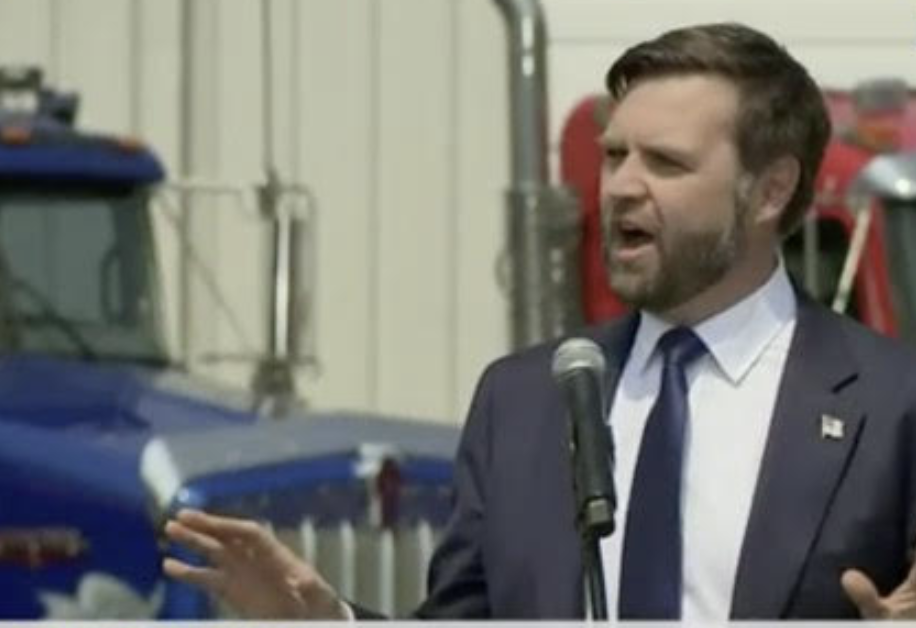
- Details
- By Levi Rickert
Native Vote 2024. GRAND RAPIDS, Mich. — Republican vice presidential candidate, Sen. J.D. Vance (D-OH), made a campaign stop at the Cordes, Inc., a agricultural transportation company, in suburban Grand Rapids, Mich. on Wednesday afternoon.
Vance spoke to a small group of supporters outside of the trucking company about the economy, which according to most polls is the number one issue voters are concerned about this election year.
“We’re going to take back the White House, we’re going to restore American manufacturing, we’re going to restore our whole country and it’s going to start right here in the state of Michigan,” Vance said.
Vance placed blame on the Biden-Harris administration for high inflation, even though the rate of inflation declined in recent months. Earlier on Wednesday, the Bureau of Labor reported the Consumer Price Index went down in July to annual rate of 2.9% and is moderating. The rate of inflation has not been that low since 2021 when the prices went up in the wake of the Covid-19 pandemic.
The vice presidential candidate also advanced the notion of the United States to produce more domestic oil in a Trump-Vance administration, even though the domestic oil production has been at record levels during the Biden-Harris administration.
“When we say that we will make America great again, we mean something simple: safe streets for our families, a secure border, affordable food for our children, and the American dream, whether it’s to buy a home or to see your children do better off than you did. That is achievable again,” Vance said.
Vance took aim at United Auto Workers (UAW) President Shawn Fain who spoke last week at the Harris-Walz rally in Detroit. He said Fain sounded like a communist at last Wednesday’s rally. The UAW has endorsed the Harris for President campaign.
"Thanks to a generation of failed leadership, Michigan has seen thousands of manufacturing jobs disappear," Vance told the crowd. "We have got to do better.”
Retiring U.S. Sen. Debbie Stabenow (D-MI) held a press conference in advance of Vance’s visit to Grand Rapids. She said Trump as president worked to ensure billionaires paid less taxes than most Michigan citizens and left the state with “hundreds of thousands jobs” fewer than when he took office in 2017.
While Vance was in Grand Rapids speaking about the economy, Trump was in Asheville, North Carolina preparing to speak on the topic of the economy later on Wednesday.
Reportedly, Vance was selected by Republican presidential nominee, former President Donald Trump, because he comes from the neighboring industrial state of Ohio. Michigan is considered a swing state with 15 electoral college votes.
Trump carried Michigan by a slim margin in 2016, the only time a Republican has carried the state in over three decades. He beat Democrat Hillary Clinton by 10,704 votes in 2016. Then, President Joe Biden beat Trump by an indisputable 154,188 votes in 2020.
It was Vance’s second visit to Grand Rapids since he became the Republican vice presidential nominee three weeks ago.
More Stories Like This
Native News Weekly (August 25, 2024): D.C. BriefsScope Narrowed, Report Withheld: Questions Mount Over Michigan Boarding School Study
Zuni Youth Enrichment Project Announces Family Engagement Night and Spring Break Youth Programming
Next on Native Bidaské: Leonard Peltier Reflects on His First Year After Prison
Deb Haaland Rolls Out Affordability Agenda in Albuquerque
Help us defend tribal sovereignty.
At Native News Online, our mission is rooted in telling the stories that strengthen sovereignty and uplift Indigenous voices — not just at year’s end, but every single day.
Because of your generosity last year, we were able to keep our reporters on the ground in tribal communities, at national gatherings and in the halls of Congress — covering the issues that matter most to Indian Country: sovereignty, culture, education, health and economic opportunity.
That support sustained us through a tough year in 2025. Now, as we look to the year ahead, we need your help right now to ensure warrior journalism remains strong — reporting that defends tribal sovereignty, amplifies Native truth, and holds power accountable.
 The stakes couldn't be higher. Your support keeps Native voices heard, Native stories told and Native sovereignty defended.
The stakes couldn't be higher. Your support keeps Native voices heard, Native stories told and Native sovereignty defended.
Stand with Warrior Journalism today.
Levi Rickert (Potawatomi), Editor & Publisher


